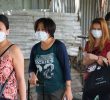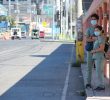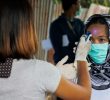DAVAO CITY, Philippines – The rescue last Friday of Covid-19 patient Arani Hajiba who went missing for days was met with mixed responses of condemnation to sympathy from netizens.
Hajiba was found by a team of Davao City Police on Friday hiding in an abandoned truck near Balusong Bridge in Matina Crossing. Hajiba escaped from the Queensland Isolation Facility on May 9.
Davao City Mayor Sara Duterte said that Hajiba will be brought back to the facility and they will conduct contact tracing to persons she possibly met. The mayor said Hajiba told authorities she stayed with her relatives in Matina Aplaya.
Hajiba will possibly face raps for violating the quarantine policy of the city.
Public sentiment
Hajiba’s case drew mixed comments in social media when the city government posted a computerized sketch of her face to ask for her whereabouts, which had more than 1,600 comments and 17,000 shares.
What triggered reactions was her cultural identity being a Badjao, a seafaring tribe that has been discriminated against in the city for their constant begging and roaming around the city.
Badjao communities are located in Matina Aplaya, Isla Verde, Barangay 23-C, and in Bucana in the city.
Some of the comments made fun of Hajiba’s ignorance.
“Ignorante, ignoranteng tawhana. Kulang gyud sa edukasyon. Maglagot ka imbis maluoy unta kay ngkasakit siya. Sa gibuhat niya pdeng masayang ra ang gains sa community quarantine ug ecq nga sobra bulan natong gisunod. (An ignorant person without education. You’ll get mad instead of pitying her for being infected. What she did would put to waste the gains of the community quarantine and the ECQ that we have been complying for more than a month.).”
“Order shoot to kill sulod sa 48 oras kng dli mg p’kita.. syaro dli ni m’surender (Give a shoot to kill order in 48 hours if she does not show up, let’s see if she doesn’t surrender),” another netizen posted.
Others gave words of sympathy right after she was brought back to the facility.
“Mga SIR and Maam please, treat her with kindness, ang homesickness tapos may COVID 19 pa XXXX. Wish her well.. Congrats to the gov’t of Davao city,” one netizen posted.
“I think there should be a regular counseling session for those asymptomatic people in the isolation facility so their mental wellness is taken care of. That should lessen or eliminate people from trying to get out of the facility,” another post said.
“Hope she gets stress debriefing, psychological or spiritual assistance kay basi na stress na sa isolation facility. Dili baya lalim i quarantine mga besh kay kung positive ka ani na sakit the battles are on the mind and emotion plus babae pa jud siya..(… maybe she was stressed in the isolation facility. It’s not easy to be under quarantine, when you’re positive with this disease the battles are on the mind and emotion plus she is a woman) Praying for her wellness and health.”
Deeper understanding
But for Leah Jabilles from Ateneo de Davao University and currently completing her doctorate thesis on indigenous affairs, she said the public and authorities should understand her situation in a perspective that Hajiba is an indigenous person and possibly does not understand the threat of COVID-19.
“Cultural appropriateness and sensitivity must’ve been observed and applied in engaging with Arani, knowing that she is a Badjao. If people like us are having a hard time understanding and coping with COVID and quarantine, how much more Indigenous people like her. We should not miss considering trauma, anxiety, and scarcity in understanding her circumstance impacted by domestic colonization and discrimination against them,” Jabilles posted on her Facebook account.
Another development worker, Angeli Gimongala, who works with a Badjao community in Zamboanga, noted the language and cultural gaps could have made it difficult for her to understand the situation.
“Working with Badjaos for a few years, it’s difficult to explain things but it’s not impossible. I wonder if she had a companion who in those times who can really connect with her, explain to her the disease and the disease process in her language while she is also provided psychosocial support services,” she said on a Facebook post.
Gimongala noted her work with Badjaos during the Zamboanga siege showed their trauma from the past. “With centuries of neglect and marginalization, do you expect them to trust you right away?” (davaotoday.com)










